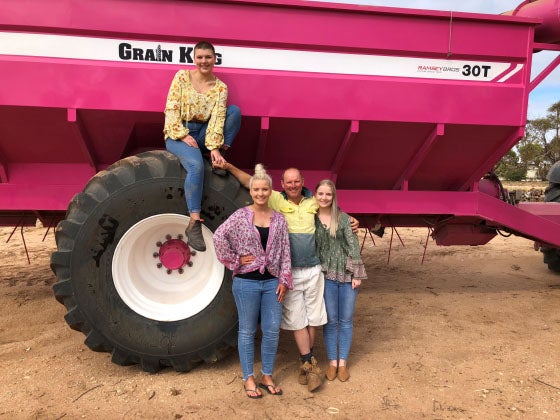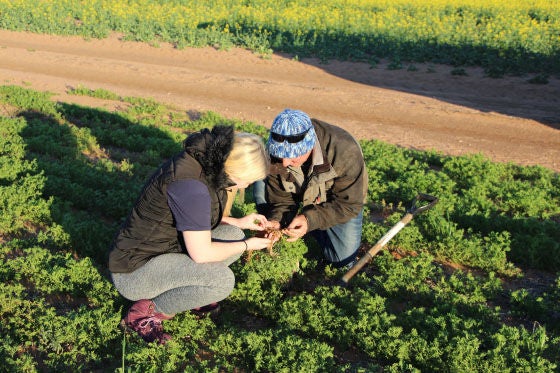Posted by on
29/05/2019
Whether it is purchasing a hot pink chaser bin to raise awareness of breast cancer or trialling warm season cover crops in a winter cropping zone, South Australian grain growers Ben and Kathy Ranford don’t shy away from trying something new.
The Ranfords are the fourth generation to own Bermondsey Park, between Cleve and Arno Bay on the Eyre Peninsula.
Ben returned to his family’s farm in 1989 after studying agricultural science, and he and Kathy took over the reins in 2016 when his parents John and Diana retired from the business.
The enterprise has evolved over the years with leasing, share farming, and land purchases in 1996 and 2009, and today Ben and Kathy continuously crop 3000 hectares.
Ben believes a strong team is invaluable to their business. He is quick to credit Kathy as office manager who keeps things on track, while in the paddock his right hand man is full-time employee, Graeme Dolphin. Ben and Kathy’s daughters Phoebe, Jade and Skye are at university and their son, Oscar, is in Year 8 but all give a hand when they are home.
A love of the land is another key ingredient of their enterprise, and Ben is unashamedly passionate about farming.
While he can list many hurdles to farming – highly variable seasons which create equally variable production results, low commodity prices and limited marketing options, increasing input/service costs and increasing compliance costs – there is no hiding the optimism in Ben’s voice.

“I believe the opportunity is to produce a product that is not a commodity, by creating a production system free of harmful pesticides to the environment, the farmer and the product.”
“I want to feel proud of the food I produce because it is healthy and nutritious, and I don’t want to expose myself or others to pesticides which have been in the system in the past, that’s why I’m getting fussier about the inputs.
“I also want to feel more like I am working with nature rather than pitted against it.
“I am confident that applying these principles to our farming systems will result in more resilient crops and greatly reduce the variability of yields and quality regardless of what the season brings.
“That, in turn, greatly reduces stress and improves our well-being, which flows through to the rest of the family, and to our business partners.”
Simplifying the system
The Ranfords are taking steps to produce grain which ticks these boxes, by changing their enterprise, embracing sustainable farming practices and looking for new marketing opportunities.
They sold their self-replacing Merino and prime lamb enterprise in 2016 – partly for economic reasons as they felt livestock was not the most profitable option for their situation, but mainly to focus on developing more diverse crop rotations and improve soils.
Ben found grazing pressure was damaging soils, particularly in lighter areas of the farm, and has seen these zones stabilise and become more productive now the sheep are gone.
Removing livestock from the system also removed the need to compromise on infrastructure, and the farm’s open layout is now better suited to wide machinery, GPS guidance and controlled traffic.
Covering all bases
The Ranfords’ winter cropping program is 50% cereals, 25% legumes and 25% canola.
In 2017, Ben planted sunflowers and millet as warm season cover crops on 80% of the farm to build soil, increase long-term productivity and protect soils and subsequent crops.

It was a move that reflected local farming challenges such as:
- Variable and often unproductive soils, including sandy loams, non-wetting sand over sodic clay or calcrete;
- Highly variable seasons – although the average annual rainfall is 325mm, in the past 25 years the Ranfords have received a high of 600mm and low of 122mm; and
- Strong winds, which are a major concern for crop production with historical soil losses from wind erosion, and damage to crops from grain loss from flowering to maturity.
It could have been a risky move in what turned out to be a 1 in 50 year dry start, but Ben observed the additional groundcover over summer helped prevent moisture loss and reduced weeds.
He terminated the cover crops in mid-January ahead of the main sowing program, but in the future will take advantage of seasonal conditions to sow summer varieties earlier and harvest them for seed production or as cash crops.
The warm season cover crops help protect soils from sun and wind damage over summer, push roots deeper into the profile to access and recycle nutrients, and build organic carbon to improve soils.
“Soil is such an important part of our real estate,” Ben said.
“We are so used to talking about the surface area of farms, but there is a huge opportunity to improve soils to increase the water holding potential and create a deeper profile for plant roots, essentially increasing the amount of soil we have available to farm.”
Ben is also moving the business forward by integrating farming practices focused on building soil health and productivity, including:
Reducing inputs: A zero tillage disc seeding system reduces the usage of many pesticides which are harmful to beneficial biology, particularly insecticides and fungicides, and he has replaced high analysis products with more gentle liquid fertilisers.
Crop selection: Diverse crop rotations and companion cropping (mixed species together) contribute to non-chemical weed control and build soil fertility.
Stubble retention: Ben harvests with a Shelbourne stripper front to maximise the straw left standing to act as a buffer for the soil surface against sun and wind. This creates a micro-climate at ground level which is much more supportive for crop establishment than bare soil.
Advice and information
Ben is an enthusiastic learner and his approach to farming has evolved by following the progress of other innovative farmers across Australia and the world, through farming groups such as South Australian No Till Farmers Association and Vic No-Till, the Nuffield network (he was a Nuffield Scholar in 2007) and Twitter.
Ben is also relishing the opportunity to meet with peers outside the cropping industry, as a member of the Rabobank Client Council. This involves quarterly meetings with Rabobank executive staff and other clients who represent a broad cross-section of agriculture in South Australia and Victoria.
The council’s objective is to identify opportunities to strengthen clients and their communities and improve the perception and awareness of agriculture by society. This may involve supporting and helping deliver existing initiatives, or developing strategies to address an issue which is not currently being addressed. There is also a major focus on succession planning and execution.
“The Client Council is essentially a conduit between the bank and its client base to communicate and provide feedback on issues impacting clients’ business, the industries they operate in and their communities,” Ben said.
“Meeting agribusiness owners from other sectors has shown me that regardless of what we produce, we all face similar challenges such as seasonal variability, increasing production costs and compliance requirements and changing social perceptions. As a result, one of the things the Client Council has reinforced for me is the need to bridge the divide between farmers and consumers.”
The Ranfords also rely on Rabobank for business support and guidance.
For example, their third land acquisition in 2009 was a major accomplishment at the time as the district was experiencing its fourth consecutive poor season, so business equity was at a historically low as was local farming confidence.
“That farm expansion could not have been achieved without the exceptional support and understanding of Rabobank,” Ben said.
It was a business decision that paid off, with the first season after purchasing an ‘absolute ripper’ which was followed by a run of six average or better years.
Rabobank was also integral to the family’s succession planning process, and Ben enjoys the regular visits from Port Lincoln Branch Manager Deborah Flint who provides benchmarking information so he can see how his business is performing against similar enterprises.
Looking ahead, Ben and Kathy will spend the next five years developing their cropping systems under their current management approach.
“At that point we will assess the next generation's attitude to the business and likely involvement,” Ben said.
“The next phase could involve succession and a transition to new management which allows all family members to have equity in the farm while pursuing their chosen careers and lifestyles.”
